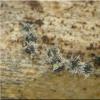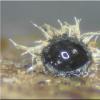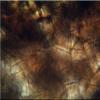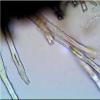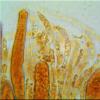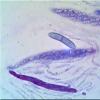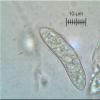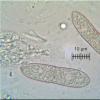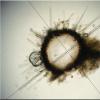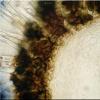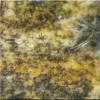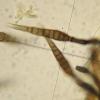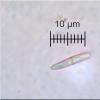
05-02-2026 15:07
Found on a fallen needle of Pinus halepensis, diam

05-02-2026 06:43
Stefan BlaserHello everybody, Any help on this one would be mu

03-02-2026 20:44
Zetti MarioWhen I first saw this white mould on an Agaricus s

18-08-2025 15:07
 Lothar Krieglsteiner
Lothar Krieglsteiner
.. 20.7.25, in subarctic habital. The liverwort i

02-02-2026 21:46
Margot en Geert VullingsOn a barkless poplar branch, we found hairy discs

02-02-2026 14:55
 Andgelo Mombert
Andgelo Mombert
Bonjour,Sur thalle de Lobaria pulmonaria.Conidiome

02-02-2026 14:33
 Andgelo Mombert
Andgelo Mombert
Bonjour,Sur le thalle de Peltigera praetextata, ne

31-01-2026 10:22
 Michel Hairaud
Michel Hairaud
Bonjour, Cette hypocreale parasite en nombre les

02-02-2026 09:29
 Bernard CLESSE
Bernard CLESSE
Bonjour à toutes et tous,Pour cette récolte de 2

01-02-2026 19:29
 Nicolas Suberbielle
Nicolas Suberbielle
Bonjour, Marie-Rose D'Angelo (Société Mycologiq
Pyrenomycete with hyaline thickwalled hairs
Maren Kamke,
12-03-2016 12:43
 Hi everybody,
Hi everybody,I found a few perithecia (diameter 0,35 mm) on Sambucus nigra without bark. Spores, hyaline, big 34-46 x 7,5-10,1 µm, becoming 1-septate. Hairs thickwalled (up to 365 µm long and 11 µm wide) with refractive walls. Asci 115-130 x 12-20 µm, IKL negative.
I thought first of an Echinosphaeria sp., but I understand that this genus has brown setae. Maybe a Trichosphaeria?
Regards, Maren
Maren Kamke,
13-03-2016 13:30
Jacques Fournier,
15-03-2016 15:17

Re : Pyrenomycete with hyaline thickwalled hairs
Hi Maren,
I think your fungus is related to the Helminthosphaeria stuppea complex (se Miller et al., 2014, Mycologia 106: 505-524), but ascospore size does not fit.
Could you check under the stereomicroscope if the ostiole is surrounded by 3-4 tubercles, as in typical H. stuppea?
Cheers,
Jacques
I think your fungus is related to the Helminthosphaeria stuppea complex (se Miller et al., 2014, Mycologia 106: 505-524), but ascospore size does not fit.
Could you check under the stereomicroscope if the ostiole is surrounded by 3-4 tubercles, as in typical H. stuppea?
Cheers,
Jacques
Maren Kamke,
15-03-2016 22:46

Re : Pyrenomycete with hyaline thickwalled hairs
Thank you Jacques,
I checked on tubercles, but there are none. I think it is indeed a species related to Helminthosphaeria stuppea. Maybe it's the same Europaean species which has been discussed many times here under the name Lasiosphaeria stuppea.
http://www.ascofrance.fr/search_forum/40144
http://www.ascofrance.fr/search_forum/14026
http://www.ascofrance.fr/search_forum/37289
Regards, Maren
I checked on tubercles, but there are none. I think it is indeed a species related to Helminthosphaeria stuppea. Maybe it's the same Europaean species which has been discussed many times here under the name Lasiosphaeria stuppea.
http://www.ascofrance.fr/search_forum/40144
http://www.ascofrance.fr/search_forum/14026
http://www.ascofrance.fr/search_forum/37289
Regards, Maren
